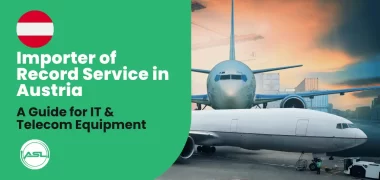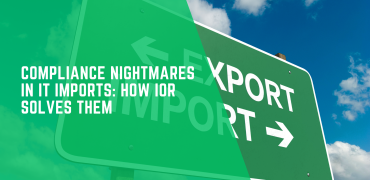Introduction
Austria, nestled in the heart of Europe, presents a lucrative market for IT and Telecom equipment due to its advanced technological infrastructure and strategic location. For businesses looking to import these goods, understanding the role of an Importer of Record (IOR) is crucial. This blog post delves into the intricacies of the IOR service in Austria, especially for IT and Telecom equipment.
What is an Importer of Record (IOR)?
An Importer of Record (IOR) is an entity responsible for ensuring that imported goods comply with local laws and regulations. The IOR is accountable for:
- Customs Documentation: Preparing and submitting all necessary documents.
- Tax and Duty Payments: Ensuring all applicable taxes and duties are paid.
- Compliance: Ensuring the imported goods comply with Austrian regulations, including product standards and safety requirements.
Why Use an IOR Service?
Using an IOR service simplifies the complex process of importing goods. Key benefits include:
- Regulatory Compliance: Ensures adherence to Austrian import laws and regulations.
- Streamlined Process: Handles all paperwork and logistics, reducing the administrative burden on your business.
- Risk Management: Mitigates risks related to customs non-compliance and potential legal issues.
Importing IT & Telecom Equipment into Austria
1. Regulatory Environment
Austria follows the European Union’s regulatory framework for IT and Telecom equipment, which includes directives such as:
- CE Marking: Indicates conformity with health, safety, and environmental protection standards.
- RoHS Directive: Restricts the use of certain hazardous substances in electrical and electronic equipment.
- REACH Regulation: Addresses the production and use of chemical substances and their potential impacts on human health and the environment.
2. Necessary Documentation
When importing IT and Telecom equipment, the following documents are typically required:
- Commercial Invoice: Details about the goods, their value, and the parties involved in the transaction.
- Packing List: Information about the contents, packaging, and weight of each package.
- Bill of Lading or Air Waybill: A transportation document issued by the carrier.
- Import Licenses: Specific licenses may be required for certain types of telecom equipment.
- CE Declaration of Conformity: Confirms that the
product complies with the relevant EU directives and standards.
3. Customs Procedures
To facilitate the importation process, it’s important to understand the Austrian customs procedures:
- Tariff Classification: IT and Telecom equipment must be classified under the appropriate HS (Harmonized System) code. Accurate classification ensures correct duty and tax calculations.
- Customs Declaration: The importer or their IOR must submit a customs declaration via the Austrian Electronic Customs System (e-zoll).
- Duty and Tax Payment: Austria, as an EU member, applies the EU’s common external tariff on imports. Value Added Tax (VAT) is also applicable on imported goods, typically at a rate of 20%.
4. Storage and Distribution
Once the equipment clears customs, it may need to be stored before distribution. Austria boasts advanced logistics infrastructure with efficient warehousing and distribution networks. Choosing a reliable logistics partner can ensure timely and safe delivery of the equipment to its final destination.
Selecting an IOR Service Provider in Austria
When choosing an IOR service provider, consider the following:
- Experience and Expertise: Look for providers with experience in importing IT and Telecom equipment into Austria.
- Local Knowledge: A provider familiar with Austrian regulations and the customs process can navigate complexities more effectively.
- Comprehensive Services: Ensure the provider offers a full suite of services, including documentation, compliance, and logistics.
- Reputation and Reliability: Check reviews and testimonials from other businesses to gauge the provider’s reliability and service quality.
Challenges and Solutions
1. Regulatory Changes Regulations can change, impacting import processes. Staying informed about updates to EU directives and Austrian regulations is crucial.
Solution: Partner with an IOR service provider that keeps abreast of regulatory changes and adjusts their processes accordingly.
2. Complex Documentation The sheer volume and complexity of required documentation can be overwhelming.
Solution: A competent IOR service will handle all documentation, ensuring accuracy and compliance, thus reducing the risk of delays or penalties.
3. Logistics and Timing Coordinating the logistics of international shipping can be challenging, particularly with time-sensitive IT and Telecom equipment.
Solution: Work with logistics partners who have a proven track record in handling tech imports and offer reliable, time-efficient solutions.
Conclusion
Importing IT and Telecom equipment into Austria can be a complex endeavor, but with the right Importer of Record service, businesses can navigate this process smoothly. An IOR ensures compliance with regulatory requirements, handles intricate documentation, and manages customs procedures, allowing businesses to focus on their core operations. By selecting an experienced and reliable IOR service provider, companies can effectively mitigate risks and streamline their import operations in Austria.
For businesses keen on tapping into Austria’s tech market, leveraging an IOR service is a strategic move that simplifies the import process, ensuring compliance and efficiency from start to finish.




